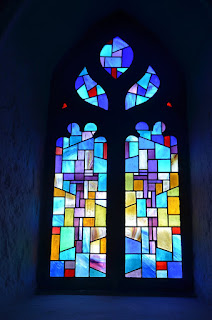Fáilte go hÉireann!
On Wednesday morning, Josh and I arrived bright and early on
the Emerald Isle – and it was quite easy to see how this country got its nickname. As soon as we left the airport,
the countryside spread out before us and everything looked unbelievably
lush. It was hard not to be excited when
we were surrounded by so much beauty. We
had decided to save Dublin for the end of the trip and instead headed southwest
out of the city. Rowers take note: on
our drive, Josh assessed the waterways here as remarkably straight and
therefore perfect for rowing. Good thing
I didn’t let him pack any oars, or we’d never get to explore the land.
Our first stop was Holy Cross Abbey, which provided a
humbling reminder that “old” suggests a very different time period when used in
Western Europe.
A grant from King Donal
endowed an abbey for Cistercian monks in the land of his mother’s people, the
O’Fogartys (just wait, more awesome Irish names to come). The Abbey was well-known for supposedly
holding a piece of the cross on which Christ was crucified; this relic inspired
pilgrims to visit the abbey for centuries.
Unfortunately for the monks, the abbey’s existence depended on the favor
of those in power, and by the 1500s, abbeys were no longer in vogue. Henry VIII decreed that monasteries were
either too wealthy or not wealthy enough – the guy was hard to please – and
therefore they should be closed. The
Holy Cross Abbey managed to survive a bit longer by handing over its ownership
to a married layman, but this was not a permanent solution. The monks retreated to private residences for
15 years, and when they returned, the abbey was in ruins. They soldiered on, but the abbey was again
plundered in 1690. Eventually, in the
late 1800s, Holy Cross was transferred to the state as a national
monument.
While it continues to provide
a cool, quiet respite from the troubles of life, the lesson of its history was
clear: in any age, it’s pretty terrible to be at the mercy of those in power.
Next, we journeyed to the Rock of Cashel, which is really a cathedral
atop a hill and not just a rock, as I initially assumed. (Hey, there are a lot of famous rocks around the world.)
At least, that’s what currently remains. At first, it was another residence for
Cistercian monks, just like Holy Cross Abbey, but its use evolved over the
years. When the Norman knights stormed through the
country, they destroyed what was originally there and a new stone cathedral in
the Gothic style was erected.
When the
Plague decimated the local population, this site eventually fell into
disrepair. The paintings on the ceilings
and walls wore away and stone crumbled. What remains, however, is still
magnificent. And since it’s on a hill,
the views are beautiful!
Our last tourist stop of the day was Cahir Castle.
This castle was the site of a major
siege, which is outlined step-by-step in a dedicated room. They even have a model with buttons for each
notable battle stage that light up that part of the model. Thousands of tiny British soldiers march in
formation towards the river, across the river, and into the castle. Eventually, the castle was given up and its
guarding garrison was spared. Much of the castle remains, making it was easy to imagine the banquet hall getting rowdy or the
occupants crowding around the massive fireplaces during the cold winter months... and, of course, defending themselves using the dropping gates, murder holes, and arrow slits.
Our first day in Ireland felt like it had a dusting of
magic. The landscapes were achingly
beautiful, the lilting accents made you want to eavesdrop, and everyone was so
kind. Plus, a place like this really
makes you love history. Can’t wait for
day two!
Spotted: A “Visit Baltimore” sticker. Probably the last thing that Josh and I
expected to see our first day on the road.
Spotted #2: Josh being a pro driver on the wrong side of the
road almost instantaneously. Thank god
he learned to drive a manual transmission car.
Spotted #3: Thatched roofs!









No comments:
Post a Comment